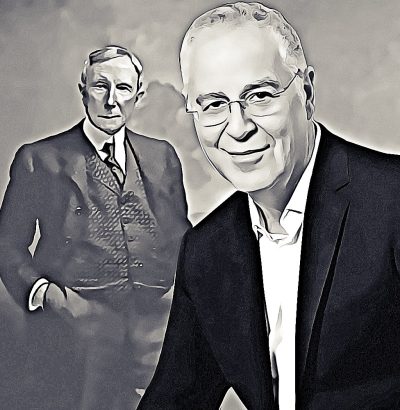The Life of John D. Rockefeller Sr.
In many ways, Ron Chernow’s magnum opus Titan has been the most influential biography that I have read in my life. This is in part because of the diversity of experiences that culminated in the life of his is subject, John D. Rockefeller, and in part because of Rockefeller’s salt of earth, humble beginnings, from which he rose to become a truly global titan, without ever losing his core sensibilities as an individual. I first read Titan at the age of 14, going through it in its entirety in one setting. I reread it when I was about 23 years old, and now in my mid-thirties I am reading it for the third time. I have a personal tendency to annotate the pages of my books, and so I am coming across riveting passages in this fresh look at an outstanding work.
As an example, one line that stood out to me in each reading was: “Rockefeller was serene in his conscience, convinced that God had blessed his career, and that the court of history would acquit him.” Although Chernow does give due weight to many corporate misdeeds committed by Rockefeller, he undertakes the exercise of understanding his subject, the original controversial billionaire of America, in a largely dispassionate manner. Above all, he carefully avoids stereotyping his subject as a crooked capitalist megalomaniac, and instead highlights the interplay between conflicting values within Rockefeller’s psyche. Some of these conflicts are diametrically opposed. Rockefeller was a deeply religious man and an avowed Baptist his whole life. He believed, as the quote above reflects, that it was divine intervention that drove his commercial success, and that he was doing the Lord’s work. Yet his behemoth, Standard Oil, engaged in countless unsavoury business tactics.

Something that inspires me, Chernow reflects on p.18, is that “we can see that there was something extraordinary about the way that stolid boy pinpointed goals, and doggedly pursued them, without any trace of childish impulsiveness.” Goal-setting has indeed been an important part of my life, helping to clear through the muddle and look towards the strategic objectives. Now that I revisit this book, twenty years after I first read it, I feel that this passage influenced me in a subliminal but significant way. Young entrepreneurs often approach me for career advice, and I always respond by asking them to set goals, and if they do not find a clear articulation of the goals to strive for, then they should seek out inspirational figures whose goal-setting might inform their own lives. If some young entrepreneurs do not have inspirational figures to draw upon, I direct them towards this very book, Titan, because this biographical work was an inspiration to me.
Titan is an extraordinary work of detail and narrative, and it is in no small part a credit to the author, Ron Chernow, that Rockefeller’s seemingly enigmatic life could be so richly contextualized. Chernow in turn has had some of the best experience in narrating the complex lives of wealthy American dynasties, as in his work on the Morgan and Warburg banking families which is equally striking in its depth. In my judgement, Chernow’s strength as a writer also stems from his ability to capture a pivotal moment in American history, documenting the dramatic post-Civil War shift from small-scale business to the era of the of giant corporations that changed capitalism and America for good.
At a personal level, then, Rockefeller’s life as characterized in Titan, would stand out as the single most inspiring biographic work I have read in my own life.
Titan: The Life of John D. Rockefeller, Sr. Hardcover – May 5, 1998. by Ron Chernow (Author). Available on Amazon.
This is part of a series of book reviews by Dr Aron Ping D’Souza.
CONTACT
I am pleased to receive your inquiries.
Thank you for your patience awaiting my response as I read every email.
